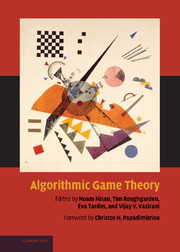Book contents
- Frontmatter
- Contents
- Foreword
- Preface
- Contributors
- I Computing in Games
- II Algorithmic Mechanism Design
- III Quantifying the Inefficiency of Equilibria
- IV Additional Topics
- 22 Incentives and Pricing in Communications Networks
- 23 Incentives in Peer-to-Peer Systems
- 24 Cascading Behavior in Networks: Algorithmic and Economic Issues
- 25 Incentives and Information Security
- 26 Computational Aspects of Prediction Markets
- 27 Manipulation-Resistant Reputation Systems
- 28 Sponsored Search Auctions
- 29 Computational Evolutionary Game Theory
- Index
22 - Incentives and Pricing in Communications Networks
from IV - Additional Topics
Published online by Cambridge University Press: 31 January 2011
- Frontmatter
- Contents
- Foreword
- Preface
- Contributors
- I Computing in Games
- II Algorithmic Mechanism Design
- III Quantifying the Inefficiency of Equilibria
- IV Additional Topics
- 22 Incentives and Pricing in Communications Networks
- 23 Incentives in Peer-to-Peer Systems
- 24 Cascading Behavior in Networks: Algorithmic and Economic Issues
- 25 Incentives and Information Security
- 26 Computational Aspects of Prediction Markets
- 27 Manipulation-Resistant Reputation Systems
- 28 Sponsored Search Auctions
- 29 Computational Evolutionary Game Theory
- Index
Summary
Abstract
In this chapter, we study two types of pricing mechanisms: one where the goal of the pricing scheme is to achieve some socially beneficial objective for the network and the other where prices are set by multiple competing service providers to maximize their revenues. For both cases, we present an overview of the mathematical models involved and the relevant optimization and game-theoretic techniques needed to study these models. We study the impact of different degrees of strategic interactions among users and between users and service providers on the network performance. We also relate our models and solutions to practical resource allocation mechanisms used in communication networks such as congestion control, routing, and scheduling. We conclude the chapter with a brief introduction to other game-theoretic topics in emerging networks.
This chapter studies the problem of decentralized resource allocation among competing users in communication networks. The growth in the scale of communication networks and the newly emerging interactions between administrative domains and end users with different needs and quality of service requirements necessitate new approaches to the modeling and control of communication networks that recognize the difficulty of formulating and implementing centralized control protocols for resource allocation. The current research in this area has developed a range of such approaches. Central to most of these approaches is the modeling of end users and sometimes also of service providers as self-interested agents that make decentralized and selfish decisions.
Information
- Type
- Chapter
- Information
- Algorithmic Game Theory , pp. 571 - 592Publisher: Cambridge University PressPrint publication year: 2007
Accessibility standard: Unknown
Why this information is here
This section outlines the accessibility features of this content - including support for screen readers, full keyboard navigation and high-contrast display options. This may not be relevant for you.Accessibility Information
- 49
- Cited by
